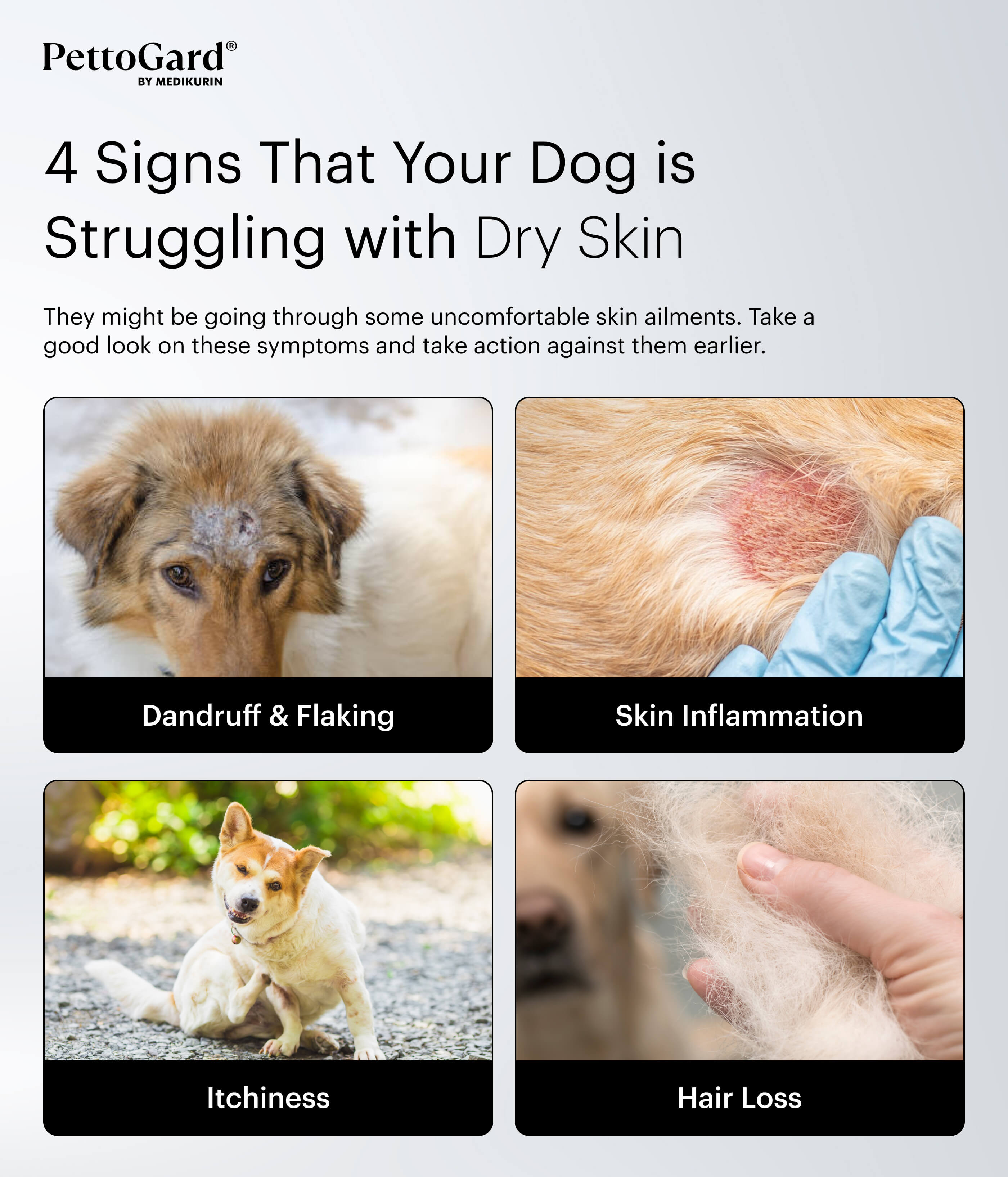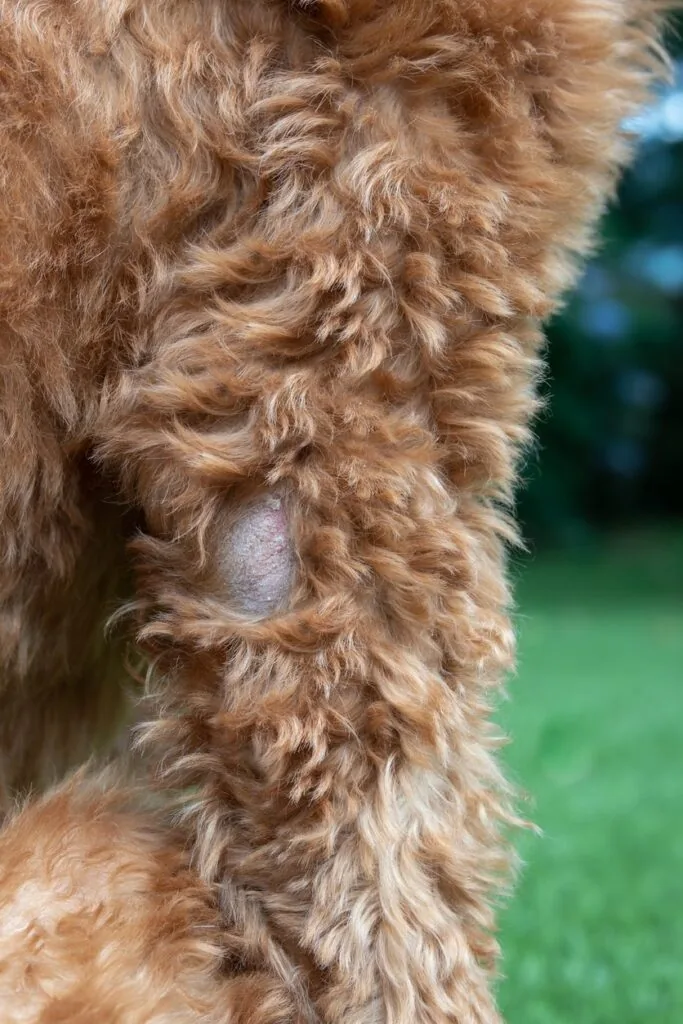To treat a dog’s dry skin, moisturize with a vet-approved lotion and ensure a balanced diet. Consult your vet for persistent issues.
Dry skin in dogs can be uncomfortable and may indicate underlying health issues. Common causes include allergies, poor diet, and environmental factors. To alleviate dryness, use a humidifier in your home and ensure your dog drinks plenty of water. Regular grooming helps distribute natural oils, keeping the skin hydrated.
Omega-3 supplements can also improve skin health. Always choose dog-specific products to avoid harmful ingredients. If symptoms persist, seek veterinary advice to rule out serious conditions like infections or parasites. Keeping your dog’s skin healthy enhances their overall well-being and comfort.

Credit: www.doglyness.com
Causes Of Dry Skin In Dogs
Understanding why your dog has dry skin is important. Identifying the root cause can help you find the right solution. Dry skin in dogs can result from various factors, such as environmental conditions, nutritional deficiencies, and allergies.
Environmental Factors
Environmental factors play a significant role in your dog’s skin health. Cold weather and low humidity can cause dry skin. Indoor heating systems can also dry out the air. Frequent bathing with harsh shampoos can strip the natural oils from your dog’s skin.
- Cold weather
- Low humidity
- Indoor heating systems
- Frequent bathing
Nutritional Deficiencies
Poor diet can lead to dry skin in dogs. Lack of essential fatty acids is a common cause. Make sure your dog gets a balanced diet. Omega-3 and Omega-6 fatty acids are vital for healthy skin. Consider adding fish oil supplements to their diet.
| Nutrient | Importance | Sources |
|---|---|---|
| Omega-3 Fatty Acids | Promotes skin health | Fish oil, flaxseed oil |
| Omega-6 Fatty Acids | Maintains skin barrier | Poultry fat, sunflower oil |
Allergies And Sensitivities
Allergies are another common cause of dry skin. Dogs can be allergic to food ingredients, pollen, or dust mites. Fleas can also cause allergic reactions. Look for signs like itching and redness. Consult your vet for allergy testing and treatment options.
- Food ingredients
- Pollen
- Dust mites
- Fleas

Credit: www.doglyness.com
Signs And Symptoms
Recognizing the signs and symptoms of dry skin in dogs is crucial. It helps ensure your furry friend gets the care they need. Below are some common indicators of dry skin in dogs.
Itching And Scratching
If your dog is scratching more than usual, it may be due to dry skin. Persistent itching is a clear sign. This can lead to further skin damage. Watch for increased licking or biting. These actions can cause hair loss and sores.
Flaky Or Scaly Skin
Another sign of dry skin is flakiness. You might notice dandruff-like flakes. These flakes can be seen on your dog’s fur. Scaly patches might also appear. Inspect areas like the belly and underarms. They are common spots for flaky skin.
Redness And Irritation
Red or inflamed skin is a symptom of dryness. Irritation can make your dog uncomfortable. Look for redness on the stomach, ears, and paws. Swelling might also occur. This often leads to other issues.
| Symptom | Description |
|---|---|
| Itching and Scratching | Increased scratching, licking, or biting |
| Flaky or Scaly Skin | Dandruff-like flakes, scaly patches |
| Redness and Irritation | Red, inflamed, or swollen skin |
By recognizing these signs, you can take early action. This will help relieve your dog’s discomfort.
Dietary Solutions
Dry skin in dogs can be uncomfortable. Dietary solutions can help. By tweaking your dog’s diet, you can improve their skin health. Below are some effective dietary solutions to tackle dry skin.
Omega-3 Fatty Acids
Omega-3 fatty acids are essential for healthy skin. These fatty acids reduce inflammation and itchiness. You can find them in fish oil or flaxseed oil. Adding these to your dog’s food can make a big difference.
- Fish Oil: Rich in EPA and DHA, good for skin.
- Flaxseed Oil: Plant-based option, high in ALA.
Consult your vet for the right dosage. Too much can cause issues.
Hydration Tips
Proper hydration is crucial for healthy skin. Make sure your dog drinks enough water. Dry skin often means your dog needs more fluids.
- Keep fresh water available at all times.
- Use a pet water fountain to encourage drinking.
- Add water to their dry food to increase intake.
Supplements For Skin Health
Various supplements can help improve your dog’s skin. These supplements provide essential nutrients missing from their diet.
| Supplement | Benefits |
|---|---|
| Biotin | Promotes healthy skin and coat. |
| Zinc | Supports skin repair and immune function. |
| Vitamin E | Acts as an antioxidant, reducing skin damage. |
Always talk to your vet before starting any new supplement. This ensures it’s safe and effective for your dog.

Credit: medikurin.com
Topical Treatments
Dry skin can make your dog uncomfortable and itchy. Topical treatments can provide quick relief. These treatments are easy to use and effective. Here are some of the best topical treatments for your dog’s dry skin.
Oatmeal Baths
Oatmeal baths can soothe your dog’s skin. Oatmeal has natural healing properties. It helps to moisturize and relieve itchiness.
- Grind plain oatmeal into a fine powder.
- Add the powder to warm bath water.
- Let your dog soak for 10-15 minutes.
- Rinse well with clean water.
Coconut Oil
Coconut oil is a natural moisturizer. It can help improve your dog’s skin health. It is rich in fatty acids and antioxidants.
- Use virgin, unrefined coconut oil.
- Massage a small amount into your dog’s skin.
- Apply once daily for best results.
Note: Test a small area first to check for allergies.
Aloe Vera
Aloe vera is known for its soothing properties. It can help reduce inflammation and moisturize dry skin.
- Use pure aloe vera gel.
- Apply directly to the affected areas.
- Repeat twice daily for relief.
Tip: Avoid products with added fragrances or chemicals.
Medicated Shampoos
Dogs can suffer from dry skin, which causes discomfort and itching. One effective solution is using medicated shampoos. These shampoos soothe and heal the skin. They contain ingredients specifically designed to target skin issues. Let’s explore what to look for in these shampoos.
Ingredients To Look For
When choosing a medicated shampoo, check the ingredients. The right ingredients make a big difference.
- Oatmeal: Soothes and moisturizes the skin.
- Aloe Vera: Reduces inflammation and promotes healing.
- Salicylic Acid: Helps remove dead skin cells.
- Coal Tar: Treats scaling and flaking.
- Hydrocortisone: Reduces itching and redness.
How Often To Use
Using the shampoo correctly is crucial. Follow these tips for best results:
- Consult your vet for the right frequency.
- Generally, start with 2-3 times a week.
- Gradually reduce to once a week as the skin improves.
- Always read the shampoo instructions carefully.
Best Products On The Market
Many medicated shampoos are available. Here are some top-rated options:
| Product Name | Key Ingredients | Benefits |
|---|---|---|
| Vet’s Best Allergy Itch Relief Shampoo | Oatmeal, D-limonene, Tea Tree Oil | Relieves itching and moisturizes skin |
| Douxo Chlorhexidine PS Shampoo | Chlorhexidine, Climbazole, Phytosphingosine | Antibacterial and antifungal properties |
| TropiClean OxyMed Medicated Shampoo | Salicylic Acid, Oatmeal, Vitamin E | Exfoliates and soothes skin |
Home Remedies
Dry skin can cause discomfort for your furry friend. Luckily, there are simple home remedies to help soothe your dog’s dry skin. These remedies are easy to use and safe for your pet.
Humidifiers
Dry air can worsen your dog’s skin condition. Adding a humidifier to your home increases moisture in the air. This can help your dog’s skin retain its natural moisture.
A humidifier is especially useful in winter. Heated indoor air tends to be dry, which can dry out your dog’s skin. Place the humidifier in the room where your dog spends most of their time.
Essential Oils
Essential oils can offer relief for your dog’s dry skin. Some oils have moisturizing and healing properties. Lavender, chamomile, and calendula oils are good options.
Mix a few drops of essential oil with a carrier oil like coconut oil. Gently massage this mixture into your dog’s skin. Do this once or twice a week.
Always do a patch test first to ensure your dog isn’t allergic.
Homemade Balms
Creating a homemade balm can help soothe your dog’s dry skin. Here is a simple recipe:
| Ingredient | Amount |
|---|---|
| Coconut Oil | 1/2 cup |
| Shea Butter | 1/4 cup |
| Beeswax | 2 tbsp |
| Vitamin E Oil | 1 tsp |
- Melt the coconut oil, shea butter, and beeswax together.
- Stir in the vitamin E oil.
- Pour into a container and let it cool.
Apply the balm to your dog’s skin as needed. This balm provides a protective layer and keeps the skin moisturized.
Preventive Measures
Preventing dry skin in dogs is essential for their overall health and comfort. By adopting a few simple measures, you can help keep your dog’s skin healthy and hydrated.
Regular Grooming
Regular grooming is crucial for your dog’s skin health. Brush your dog’s coat frequently to remove dirt and loose fur. Bathing your dog with a gentle, hypoallergenic shampoo can prevent skin dryness. Make sure to use lukewarm water and avoid hot water, which can strip natural oils from the skin.
Balanced Diet
A balanced diet plays a key role in maintaining your dog’s skin health. Include omega-3 and omega-6 fatty acids in their diet. These nutrients help keep the skin moisturized. Feed your dog high-quality, nutrient-rich food to support their skin and coat health.
- Omega-3 and Omega-6 fatty acids
- High-quality protein
- Essential vitamins and minerals
Avoiding Allergens
Avoiding allergens is vital to prevent dry skin in dogs. Identify and eliminate potential allergens in your dog’s environment. These can include certain foods, cleaning products, and pollen. Keep your home clean and free of dust and mites. Choose hypoallergenic products for your dog’s bedding and grooming needs.
Here’s a table summarizing common allergens and solutions:
| Allergen | Solution |
|---|---|
| Food | Choose hypoallergenic dog food |
| Pollen | Limit outdoor exposure during high pollen seasons |
| Cleaning Products | Use pet-safe, non-toxic cleaners |
When To See A Vet
Dry skin in dogs can be concerning for pet owners. While many cases can be managed at home, some situations require a visit to the vet. Knowing when to seek professional help is crucial. Below are some signs that indicate it’s time to consult a veterinarian.
Persistent Symptoms
Dry skin that doesn’t improve with home treatments needs a vet’s attention. If your dog’s skin remains flaky, red, or irritated for more than two weeks, this could signal an underlying issue. Persistent scratching, biting, or licking are also red flags.
Severe Reactions
Severe reactions like swelling, intense itching, or pain should never be ignored. If your dog shows signs of distress, such as whining or avoiding touch, it’s time for a vet visit. Extreme reactions can indicate allergies, parasites, or other serious conditions.
Skin Infections
Skin infections often accompany dry skin. Watch for signs like oozing sores, crusty patches, or foul odor. Infections can quickly worsen and spread. Early intervention is crucial for effective treatment.
| Symptoms | Possible Issues |
|---|---|
| Flaky, red, or irritated skin | Underlying health issues |
| Swelling or intense itching | Allergies or parasites |
| Oozing sores or foul odor | Skin infections |
Regular check-ups and prompt attention to symptoms ensure your dog’s health. Don’t wait too long to seek help if you notice these signs.
Frequently Asked Questions
What Causes Dry Skin In Dogs?
Dry skin in dogs can be caused by various factors. Common causes include allergies, poor diet, and environmental conditions. Consult your vet for an accurate diagnosis.
How Can I Treat My Dog’s Dry Skin?
Treat your dog’s dry skin by moisturizing regularly. Use dog-specific shampoos and conditioners. Increase their omega-3 intake for better skin health.
Can Diet Affect My Dog’s Skin Condition?
Yes, diet significantly affects your dog’s skin condition. Ensure a balanced diet rich in omega-3 and omega-6 fatty acids for healthy skin.
Are There Home Remedies For Dogs’ Dry Skin?
Yes, home remedies like coconut oil, oatmeal baths, and fish oil supplements can alleviate dry skin in dogs. Always consult your vet first.
Conclusion
Caring for your dog’s dry skin involves regular grooming and proper nutrition. Use moisturizing shampoos and conditioners. Consult your vet for persistent issues. Ensure your dog gets a balanced diet rich in essential fatty acids. Keep your furry friend hydrated and comfortable for healthier skin and a happier life.








